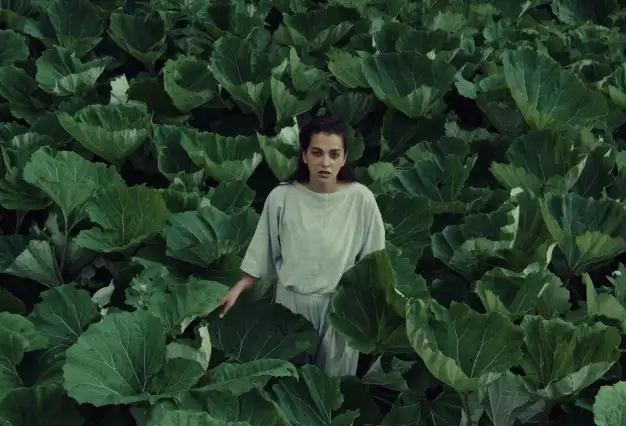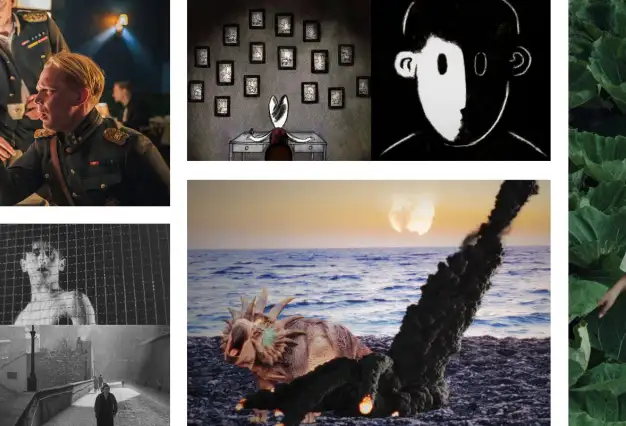moloko film: Auteur cinema with a social edge

The Czech production outfit moloko film works across fiction, documentary, and experimental formats, with a focus on socially grounded, auteur-led storytelling. The company fosters long-term collaborations as well as international coproductions, with projects often addressing topics of identity, marginalization, and institutional structures. In recent years, its scope has expanded to include animation, interdisciplinary work, and scripted television.
by Martin Kudláč for CZECH FILM / Fall 2025
Established in Prague in 2010 by producers Miloš Lochman and Karel Chvojka, moloko film is a Prague-based production outfit focused on developing and producing feature films, documentaries, and short-form works with a strong authorial perspective. The company supports projects from early development through to international distribution, often working across borders in European and regional coproductions. Its activities extend to animation, experimental formats, and, more recently, television.
The company’s editorial line is defined by a focus on socially engaged content and narratives anchored in contemporary or historically layered contexts. Many of its projects explore themes related to identity, marginality, and institutional dynamics, often through character-driven storytelling. moloko film regularly collaborates with directors whose work bridges personal narrative with a broader cultural or political framework.
Anchored in the social, expanding in form
At the core of moloko film’s production slate is an enduring preoccupation with characters and communities at the margins, those navigating invisible boundaries of class, gender, identity, and historical memory. This focus is evident in the company’s breakthrough project, The Way Out (2014), a joint venture with producer Jan Macola of Mimesis Film, directed by Petr Václav. A stark social-realist portrait of a young Romani woman striving to overcome systemic marginalization, the film marked the return of Czech cinema to Cannes after nearly two decades, premiering in the ACID sidebar. Domestically, it became the most awarded Czech film of the year, winning seven Czech Lions and four Czech Film Critics’ Awards.
This focus on lives lived at the margins continued with Filthy (2017), the feature debut of Tereza Nvotová. The psychological drama offered a visceral exploration of trauma, silence, and institutional complicity in the wake of sexual assault. The collaboration with Nvotová has since evolved into a long-term creative partnership. Her sophomore feature, Nightsiren (2022), merged feminist horror with folkloric motifs in a remote mountain village gripped by superstition. The film premiered at Locarno, where it won the Golden Leopard in the Cineasti del presente competition, and has been sold for theatrical distribution in North America, Poland, Japan, and German-speaking territories.
The company has also expanded its scope into nonfiction filmmaking. Dagmar Smržová’s I Want You If You Dare (2019) presented an unvarnished portrait of Jana, a bedridden young woman with cerebral palsy whose unrelenting desire for love, intimacy, and independence cuts through layers of social taboo, family dysfunction, and institutional neglect. moloko film followed that with A New Shift (2020), directed by Jindřich Andrš, about a laid-off coal miner who retrains as an IT specialist in Ostrava, the Czech Republic’s postindustrial heartland. The film combines observational rigor with wry social commentary, and netted awards at Ji.hlava and DOK Leipzig. In addition, La Reine (2023) by Nikola Klinger offered a meditative, essayistic study of aging, memory, and care. Set on a former lavender distillation farm in the south of France, the film centers on 79-year-old Ian, a semihermit dispensing essential oils and quiet wisdom to a dwindling community.
Alongside its feature-length projects, moloko film continues to foster a slate of short and experimental works. These include Vinland (2022), Martin Kuba’s graduation film, which tells the story of a Georgian migrant worker caught in the grip of a modern-day labor mafia in Prague. The Glory of Terrible Eliz (2021), codirected by Eliška Kováříková and Adam Struhala, is a sharply stylized coming-of-age triptych in which three boys reimagine a mysterious classmate through fantasy, horror, and surreal romance; it premiered in the BUFF Malmö Filmfestival. The company’s short film output entails also experimental works such as Tomáš Rampula’s Time Metallurgist (2024), which manipulates archival materials, including early photographic studies by Eadweard Muybridge, using AI-generated techniques to draw connections between 19th-century industrial expansion, colonial violence, and today’s ecological crisis. The company’s most recent short, Dirty Shirley (2025), directed by Julie Béna, deconstructs US pop-cultural tropes, from reality television to road movies, within a conceptual visual language that speaks to contemporary psychological dislocation and the ongoing search for identity.
moloko film has also ventured into international coproduction, most notably with Imago (2023), a Polish period drama directed by Olga Chajdas. Set in the waning days of communist Poland, the film follows a young woman recently released from a psychiatric hospital as she deals with early motherhood, generational divides, and the post-punk music scene amid the broader political transition.
Scaling up with new voices
Following a decade of steady growth, moloko film is entering a new phase defined by genre explorations, deeper codevelopment partnerships, and a sharpened focus on interdisciplinary and international collaboration. At the forefront of this new chapter is Father, the latest feature from long-term collaborator Tereza Nvotová, set to premiere in the Orizzonti competition at the Venice Film Festival. A formally daring psychological drama, Father reconstructs the aftermath of a real-life tragedy, the death of a child, through long, continuous takes and a striking first-person perspective. A Slovak-Czech-Polish coproduction, the film examines personal grief, public scrutiny, and the shifting dynamics of guilt and social judgment. Intramovies is handling world sales, with theatrical premieres in coproduction countries slated for September 2025.
Also recently completed is Grandpa, Let’s Go!, the newest work by Polish director Olga Chajdas. A hybrid of live-action and animation, the family film follows a spirited young girl and her rebellious grandfather on an unexpected adventure, blending elements of road movie, fantasy, and intergenerational drama. Anchored by the performance of veteran actor Jan Peszek, the film continues moloko film’s commitment to character-driven storytelling across genres and age groups.
In postproduction is Three Weeks Under the Sea, the feature debut of Martin Kuba, another filmmaker with whom moloko film has developed a sustained collaboration. A Czech-Slovak-Polish-Latvian coproduction, the film follows a young man returning to his Ukrainian hometown for a staged funeral that gradually reveals his estranged father’s past as a Soviet military officer. As the protagonist uncovers connections to organized crime and Cold War–era arms smuggling, the film deftly intertwines personal trauma with geopolitical legacy, set against the fractured landscape of post-annexation Ukraine.
moloko film’s interest in cinematic innovation extends beyond narrative features into the realm of contemporary art and experimental form. The company maintains a strong dialogue with artist-filmmakers, supporting works that expand the language of cinema and embrace new technologies. One such project is Polar Night Madness, Tomáš Rampula’s follow-up work to Time Metallurgist, a psychological drama with horror elements set during the 1897-1899 Belgian Antarctic Expedition; the film is in postproduction and slated for completion in March 2026. As a ship’s crew is trapped in ice-bound isolation and perpetual darkness, Rampula explores the deteriorating human psyche under extreme conditions. Drawing a parallel between historical psychological strain and contemporary mental health challenges, particularly those linked to climate anxiety and environmental stress, the film bridges period drama with urgent, present-day resonance.
The company’s upcoming slate further reinforces its commitment to emerging domestic voices. Among the new projects is Regular (2027), a youth-driven drama by David Hofmann and Ondřej Erban that delves into skateboarding culture, substance use, and adolescent drift in a small-town setting. The Czech-Polish-Slovak-Estonian coproduction contrasts the freedom of nocturnal urban rides with the emotional weight of coming-of-age at the margins.
Another production currently underway is Endless Ride (2026), a documentary by Johan Kolínský profiling Jirka and Petr, two lifelong wheelchair users whose irreverent humor, social media presence, and active engagement in music and sports challenge common perceptions of disability. As key members of the band The TapTap, the duo use satire and unfiltered commentary to address life with a disability, while pursuing personal ambitions in media and advocacy.
In parallel, moloko film continues to pursue artist-led projects interrogating themes of identity, power, and social performance. Goddess Thea (2027), a collaboration with visual artist and FAMU graduate Barbora Kleinhamplová, is a character-driven documentary centered on Thuy, a Vietnamese dominatrix navigating the intersections of race, gender, and erotic labor in contemporary Prague. Having arrived from Hanoi at age five, Thuy grapples with cultural displacement, everyday racism, and emotional detachment while forging an identity within the BDSM community. Shot across Prague and Berlin, the film offers a nuanced, visually evocative meditation on control, desire, and the search for connection in a fractured world.
Breaking into scripted TV
In 2019, moloko film expanded into episodic storytelling, serving as executive producer for the Czech segment of the international crime miniseries The Pleasure Principle, directed by Dariusz Jablonski. The Eastern European noir begins with the discovery of three seemingly unrelated murders in Odessa, Warsaw, and Prague, gradually revealing a single interconnected case. Featuring a multinational cast and production team, the series brings together investigators from Ukraine, Poland, and the Czech Republic in cross-border pursuit of a serial killer. Produced by Apple Film Production for Canal+ Poland, Czech Television, and Star Media Ukraine, The Pleasure Principle stands as one of the region’s first high-end international coproductions for television.
Seeking to build on this experience and further integrate small-screen production into its portfolio, moloko film is now developing Snowbound, a psychological thriller set in a remote mountain lodge near the Czech-Polish border. The story follows a former undercover policeman living under a false identity, only to find himself surrounded by others harboring secrets of their own. Exploring themes of hidden pasts, betrayal, and institutional disillusionment, the series is a Czech-Polish coproduction currently in early development, with Czech Television attached.
In parallel, the company is also developing Red Princess (2028), a stylized historical series written by Barbora Námerová (Filthy, Nightsiren), based on the little-known life of Archduchess Elisabeth Marie of Austria, daughter of Crown Prince Rudolf. Set amid the political and social fallout of the Habsburg Empire’s decline, the series portrays a woman’s personal rebellion against dynastic expectations and societal convention. Drawing visual inspiration from films such as Marie Kreutzer’s Corsage, the series is being positioned as an international coproduction with a strong auteurist and design-led sensibility.
Related news
Related people
Karel Chvojka
Producer, Film Contact
Miloš Lochman
Czech Republic





